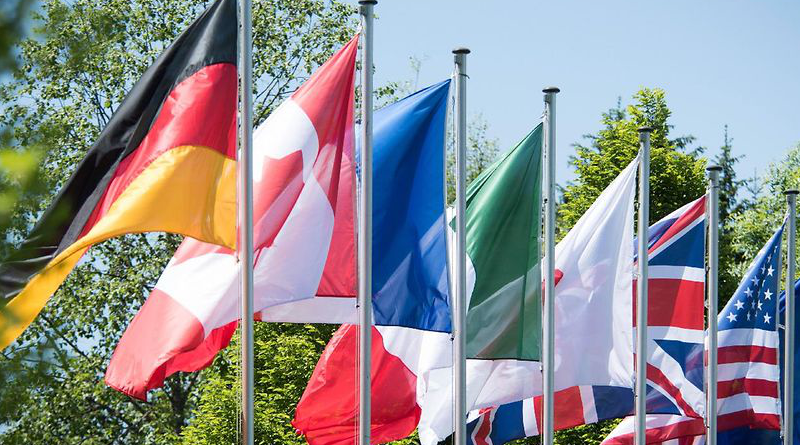Why There’s More Than Economics To The G7’s Role – OpEd
By Arab News
By Andrew Hammond*
The G7 was created amid the instability of the 1970s to monitor developments in the world economy and assess macroeconomic policies, but its role as a geopolitical linchpin has long been important too.
This is being showcased during this year’s German presidency of the G7, which has been recast by the Russian invasion of Ukraine. The powerful group comprising Japan, the US, Canada, Germany, France, the UK and Italy have in recent weeks implemented a massive international package of sanctions against Moscow; pledged never to recognize any redrawn boundaries for Ukraine; provided hundreds of millions of dollars in military assistance; and are currently looking at the feasibility of a plan to use Russian assets to rebuild Ukraine.
Inside Ukraine, large parts of cities such as Mariupol and Kharkiv have been obliterated, and many other towns and villages have also been reduced to ruins. What the G7 is looking into is how hundreds of billions of dollars in frozen Russian assets might be used to finance reconstruction in what would be a mini version of the postwar Marshall Plan — the US-financed rebuilding of post-war Europe, partly to protect it from communist takeover.
The G7 is also being urged by international stakeholders to take concerted action to fight a looming global hunger crisis as the war in Ukraine continues to impact global food security. It is estimated by the International Rescue Committee that an additional 47 million people could be facing acute hunger in world crisis zones such as the Sahel, Afghanistan, Yemen, and the Horn of Africa.
For example, the Sahel region of Africa, the 5,400-kilometer belt from the Red Sea to the Atlantic, is facing its worst food crisis in a decade. The region depends on Ukraine and Russia for between 30 and 50 percent of its wheat imports.
Since the invasion of Ukraine, relations are now so poor between the G7 and Russia that Moscow may never be readmitted to the bloc, restoring the G8. Russia joined the summits from 1997 to 2013, but after the annexation of Crimea, Moscow was told it could rejoin only if “it changes course and an environment is once again created in which it is possible for the G8 to hold reasonable discussions.”
This year’s G7 discussions on Ukraine are only the latest example of the prominence of geopolitical and security issues in the bloc’s meetings. In recent years, the body has played a significant orchestration role in the West’s policies toward Libya, North Korea and the South China Sea.
The Italian G7 presidency in 2017, for instance, placed strong emphasis on turbulence in North Africa and the Middle East, including Iraq, Libya and Syria. This included a push toward fostering stability in Libya following the collapse of the Qaddafi regime.
Another example was the discussion on the South China Sea during Japan’s presidency in 2016. Then, the G7 warned of “any intimidating coercive or provocative unilateral actions that could alter the status quo and increase tensions” given the territorial disputes over several archipelagos there involving countries such as China, Vietnam, Malaysia and the Philippines.
This prompted strong objections from China, which claims much of the South China Sea; Beijing asserted that the G7 should focus its time on its founding mandate of global economic cooperation. As this reaction indicates, the G7’s involvement in its geopolitical dialogues, from Asia to the Middle East and Europe, has met with significant international criticism from time to time.
Building from this, it is also sometimes asserted, especially by developing countries, that the G7 lacks the legitimacy of the UN to engage in these geopolitical and security issues, or is a historical anachronism given the rise of new powers, including the BRICS. However, it is not the case that the international security role of the G7 is new.
An early example of the linchpin function the body has played here was in the 1970s and 1980s when it helped coordinate Western strategy toward the Soviet Union. Moreover, following the September 2001 terrorist attacks, the G8 (then including Russia) assumed a key role in the US-led campaign against terrorism. This began with coordinated activities helping to tackle sources of terrorism finance and, later, a global partnership against the spread of weapons of mass destruction.
Another key security role came over Kosovo in 1999. Following unsuccessful efforts to resolve the crisis in the UN Security Council, compromise was reached between the West and Russia in the G8. Foreign ministers then drew up a resolution that was agreed at the UN.
Taken overall, the German-hosted G7 will be dominated by its geopolitical dialogue, despite criticism of its actions in this area. The body’s longstanding track record as a security actor, and the continuing uncertainty over the Ukraine conflict, underlines that this role is not only likely to continue but could yet grow in significance.
- Andrew Hammond is an Associate at LSE IDEAS at the London School of Economics

